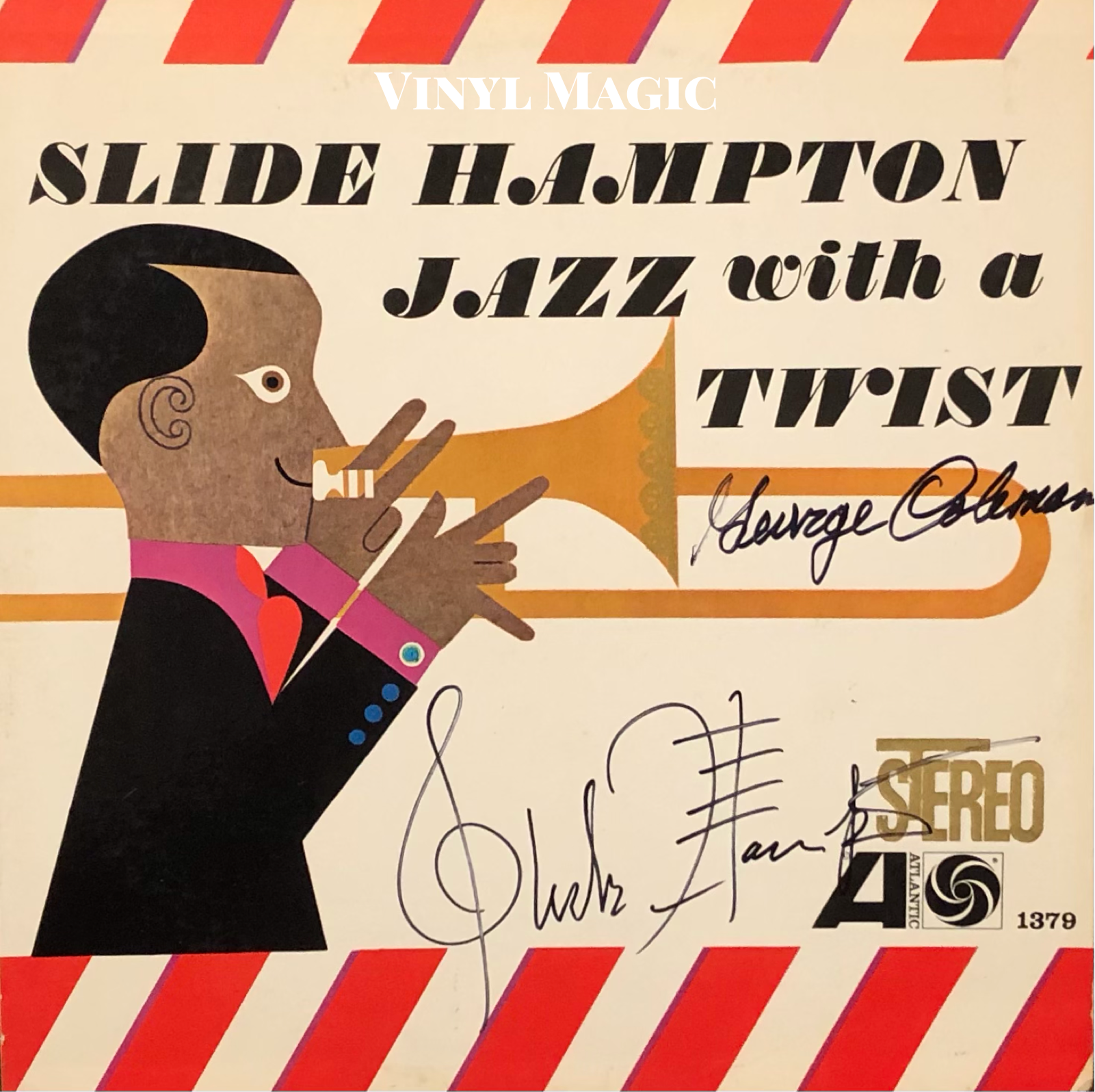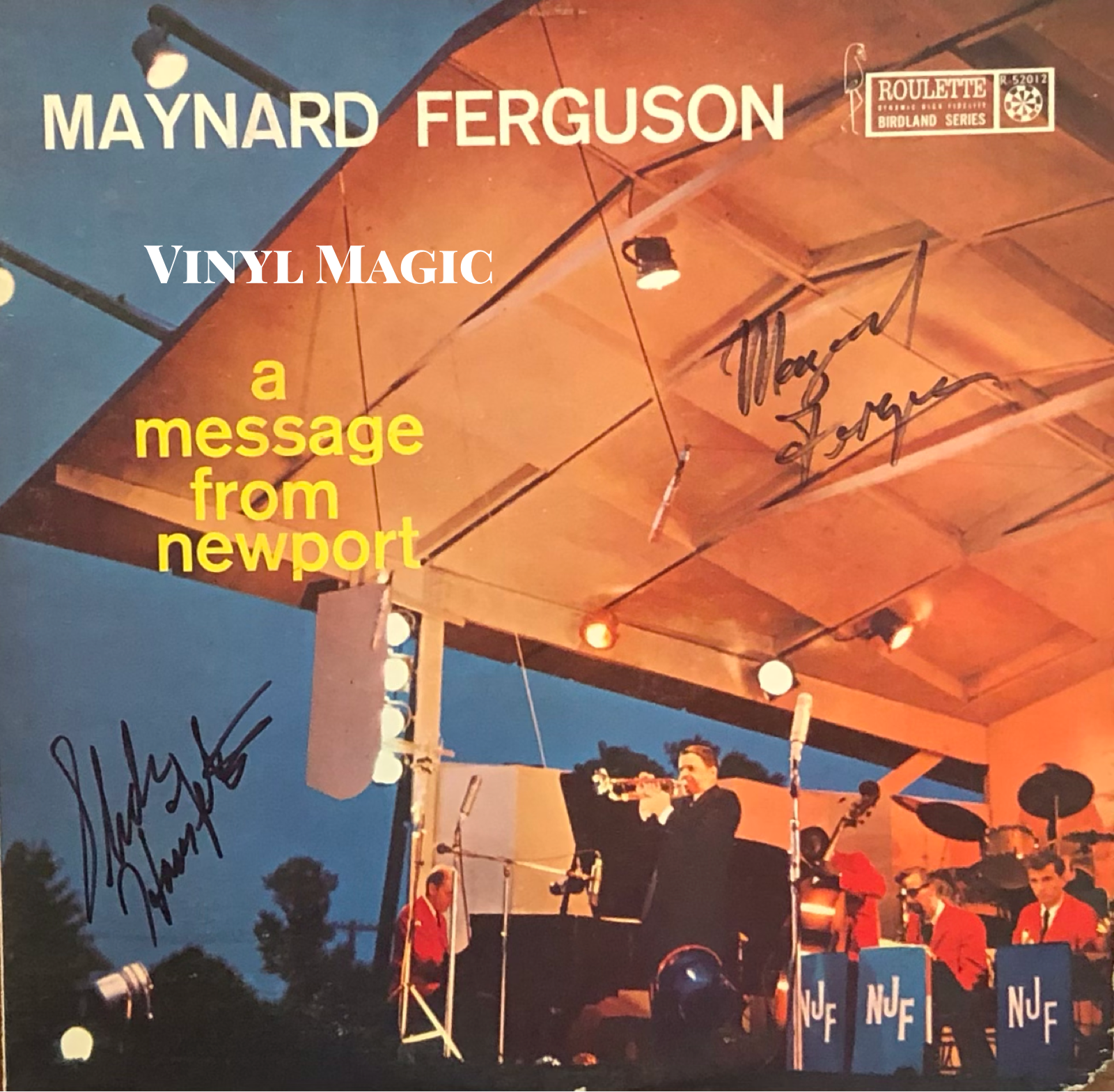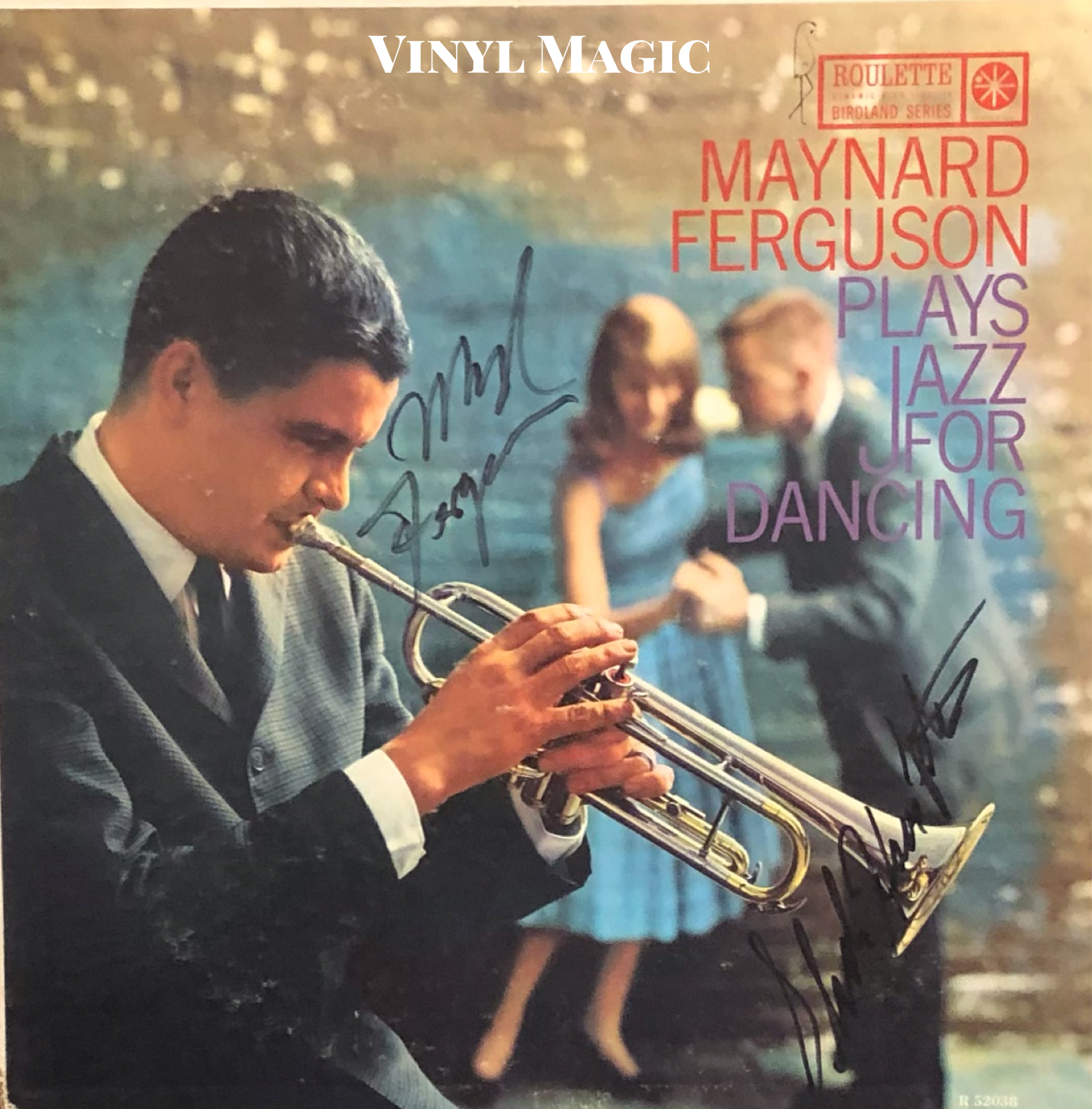Slide Hampton and Me…
It's very important for people to know what the real purpose of music is. They think that music often is just for their entertainment, and it's certainly entertaining but it's for a much more serious reason than that. Without music and without art, we'd really be in trouble on this planet. We're in enough trouble as it is, but it's nothing like it would be... Music is very, very therapeutic, very healthy for people.Slide Hampton, interview 2000
The trombone is the kind of instrument that you can be a natural musician, but you still have to dedicate yourself to it in order to have any level of proficiency. Otherwise, the trombone will give you the impression that it's a very difficult instrument to play, but it's not really the trombone that's difficult. It's your understanding that counts, your willingness to dedicate yourself to developing a rapport with the instrument and understanding the nature of the instrument.
Slide Hampton
Slide Hampton and His Horn Of Plenty (1959) signed by Slide, George Coleman
See, I had a big house in Brooklyn. Eric Dolphy lived there for a long time. Freddie Hubbard lived there, and Wes Montgomery. Trane used to come here all the time, and Wayne Shorter used to live there. We had thirteen, fourteen rooms in the house, right in Fort Greene (Brooklyn), right around the corner from Spike Lee's father, (bassist) Bill Lee. A lot of musicians lived in the area, there were jam sessions and people practicing and rehearsing for years. 245 Carlton Avenue, Eric Dolphy recorded a song on one of his albums called "245."
Slide Hampton, jazz life in Brooklyn
Ego was never a thing for them, they always felt more humble. Dizzy (Gillespie) was a very humble guy and Trane, Trane was very humble, very beautiful and very humane and, "What can I do to help somebody?" This is the healthiest attitude that a person can have. Society has to grow on that kind of energy. Then we won't have all the stuff that's starting to become so common, with everybody being against everybody else. Now you have to be "inferior" if you're different. That's a fool's idea! You know, you can never tell what a person has to offer you unless you're able to be open to that person, and go to them and see what kind of communication you can have.Slide Hampton interview 2000
Two Sides Of Slide (1962) signed by Slide, George Coleman
The great Slide Hampton passed away November 18, 2021. He was eighty-nine years old and I wish peace and blessings for his family. Slide leaves an impressive legacy of music as a skilled arranger, composer, educator, and virtuoso trombone soloist. He released more than thirty-five albums as a leader and he recorded extensively with jazz legends Art Farmer, Dizzy Gillespie, Dexter Gordon, Hank Mobley, Charles Mingus. McCoy Tyner and many others in his lengthy discography. Though he was in declining health the past several years, his music will live an enduring life among jazz aficionados and music fans.
Born in Jeanette, Pennsylvania, raised in Indianapolis, Indiana, Locksley Wellington "Slide" Hampton was surrounded by music. Both parents were musicians and his father had a family orchestra based in Indianapolis. One of twelve siblings who played musical instruments, Slide came by his choice of instrument at the direction of his family, “When I was young, there was already a band in existence in the family. There were no trombones and they wanted a trombone player in the family band, so they chose it for me.” A serendipitous choice and a remarkable career followed. Slide is lauded as one of the top trombone stylists in the annals of jazz history, quite an achievement for an unwieldy and somewhat clunky instrument.
Jazz With A Twist (1962) signed by Slide, George Coleman
The Hampton family band had local renown and eventually played Carnegie Hall, where Slide made his debut. It was very heady stuff, as Slide recalled, "First we came and played Carnegie Hall and then we went back to Indianapolis.Then we came back and played the Apollo Theater, the Savoy Ballroom, and after two weeks in the Savoy, we went back into the Apollo Theater by popular demand. I tried to convince my family, 'Let's stay in New York. This is the place we can really develop a career as musicians.' But they wanted to go back to Indianapolis." These initial experiences left an indelible impression, "I wanted to get back to New York as quick as I could 'cause I'd seen and heard Bud Powell and people like that. After that, all of my aspirations were keyed to New York. So as soon as I was old enough and I could go out on my own, I left the family band and I was on my way to New York. It took me a long time to get there."
Slide made it back to New York when he joined Buddy Johnson's rhythm and blues group in 1952. It was a circuitous route which started in Houston where Buddy was based. Buddy Johnson was best known for the jazz standard "Since I Fell For You" which Buddy's sister Ella sang and Arthur Prysock's "They All Say I'm The Biggest Fool." Slide developed his craft, honed his chops and soon joined Lionel Hampton, a brief and unsatisfying experience, "Lionel Hampton is also a great musician, but really not a caring person. He never really tried to give the musicians the kind of conditions that they could work in and would inspire them, and he never really inspired people to go to other heights. If you were with his band and he really liked you, he would almost threaten you if you wanted to leave and go with somebody else. And that was very unfortunate because he was a guy that had possibilities, especially for a lot of the Afro-American musicians, to open doors for them. But he was such an egomaniac, he couldn't consider what was happening for anyone else." An interesting insight which confirmed what I saw when Lionel performed decades later. When Lionel started a solo, even in his late eighties, it went on and on and on... twenty plus years later, I think Lionel is still somewhere banging that same solo!
A Message From Newport (1957) signed by Slide, Maynard Ferguson
Fortunately, Slide's next employer was less egocentric, as he joined the trumpet great Maynard Ferguson, "Maynard was a very nice guy, a very fine musician, and really gave all the musicians a chance to develop musical expertise there. He was the exact opposite from Hamp... He was really very considerate of the musicians and very respectful of us." Slide began to write charts and some of his compositions - "The Fugue," "Three Little Foxes," "Slide's Derangement" - became mainstays of the Maynard Ferguson canon.
After three years, Slide left Maynard to concentrate on his solo career and released several acclaimed records which featured a collection of top flight horn players George Coleman, Joe Farrell, Freddie Hubbard, and Booker Little among them. In the mid 1960s, Slide was enlisted by Motown Records and worked as a music director for Stevie Wonder and the Four Tops, and he helped write arrangements on some of their recordings.
Plays Jazz For Dancing (1959) signed by Slide, Maynard Ferguson
As the interest in jazz waned due to the commercial onslaught of The Beatles and other rock music, Slide toured Europe and stayed in Paris for the next six years, joining a fertile expat jazz community including Don Byas, Kenny Clarke, Art Farmer, Dexter Gordon, and Johnny Griffin. Slide was drawn in part by the extraordinary respect given to jazz artists at that time, "So I went to Europe and found out that there were a lot of opportunities for people that were into that concept of music. I went over with Woody Herman in '68 and we played two weeks in England. Then I went to France, and I lived in France for six years after that. I did television, recording, radio, which they don't have over here. You know, they have radio orchestras and radio programs that are subsidized by the government for a certain amount of jazz - concerts, cultural houses, everything you could think of. It had never been like that over here."
Returning to the United States in 1977, Slide began his impressive and influential career as an educator, first as an artist-in-residence at Harvard, and later serving professorial stints at the University of Massachusetts in Amherst, DePaul University in Chicago, and Indiana University. He was a mentor to countless students, not only trombonists, but also arrangers who studied his charts and his deft interplay of the instruments while enhancing the melodies. He also won two Grammys late in his career, as the arranger for Dee Dee Bridgewater’s "Cotton Tail" in 1998 and for Best Large Jazz Ensemble Album for The Way: Music of Slide Hampton in 2005.
Si! Si! M.F. (1962) signed by Slide, Maynard Ferguson
I was blessed to see Slide Hampton more than twenty years ago at the Blue Note in New York City. He was sitting in with his old friend Maynard Ferguson, and Maynard had reprised some of Slide’s classic arrangements. As an added bonus, Slide layed out on the trombone for a couple of tunes. In Slide’s virtuosic hands, the trombone glided and glistened, and the warm tones were only exceeded by the warmth and kindness he exuded offstage when I met him. After the show, there was a scene in the Blue Note dressing rooms as fellow trumpet greats Jimmy Owens and Jonah Jones came by to pay their respects to Maynard and Slide. I slipped in and Slide was gracious to sign his vinyl. He was of impossibly good cheer and I thanked him for his time and, especially, his music.
Slide Hampton, a virtuoso musician, as impressive on stage as off. His music is emphatically entertaining, healthy and therapeutic!
Swings Through College (1958) signed by Slide, Maynard Ferguson, Jonah Jones
Choice Slide Hampton cuts (per BKs request)
https://www.youtube.com/watch?v=g52wGTQ_s7M
“Night Never Comes” live in Italy 1971
https://www.youtube.com/watch?v=yN4P17pAdJ8
“The Fugue” A Message From Newport 1958
https://www.youtube.com/watch?v=uzSuoyp1ljU
“Mack The Knife” Jazz With A Twist 1961
https://www.youtube.com/watch?v=FwoW_JQCZqU
“The Thrill Is Gone” Somethin’ Sanctified 1961
https://www.youtube.com/watch?v=WVXm16mAxz8&list=PLyHn3f7-9IULaKcL7ZLNOw_cH8PgPuQxd
“My Blues” A Day In Copenhagen with Dexter Gordon 1969
https://m.youtube.com/watch?v=jbbf2quuv6Y
“All In Love Is Fair” Slide plays Stevie Wonder!
https://www.youtube.com/watch?v=XvKF82hkReI
“Roots” with Clifford Jordan, Cedar Walton, Billy Higgins 1985
https://www.youtube.com/watch?v=bht4ySeQwjc
“All The Things You Are” live with Dizzy Gillespie, Johnny Griffin, Hank Jones 1987
https://www.youtube.com/watch?v=jJ7za4mOzSo
“Lament” Slide plays J.J. Johnson! 1968
https://www.youtube.com/watch?v=4FzQ1i--4QU
“Well You Needn’t” Slide plays Thelonious! 1962
https://www.youtube.com/watch?v=NzWSNBxe588
“Sunny” Slide Hampton 1970
https://www.youtube.com/watch?v=tEDwNok0nF0
“Solar” Slide Hampton plays Miles! 1985
Bonus picks:
https://www.youtube.com/watch?v=1AZnXclm0Bs
“I Was Made To Love Her” Stevie Wonder 1966
https://www.youtube.com/watch?v=vJ7iEZyrBcQ
“On The Street Where You Live” The Four Tops 1967
https://www.youtube.com/watch?v=CIm1MJqtH5o
“That’s Life” Kim Weston - Count Basie Orchestra arranged by Slide
https://www.youtube.com/watch?v=yBHorI2_yOY&list=OLAK5uy_lknmi9DgyFAFkhhBjMO6bIKbhPIzVJajQ&index=12
“Nice ‘n’ Easy” The Four Tops 1967
https://www.youtube.com/watch?v=G_4NTGKVzLs
“The Beat Goes On” Kim Weston - Count Basie Orchestra arranged by Slide






